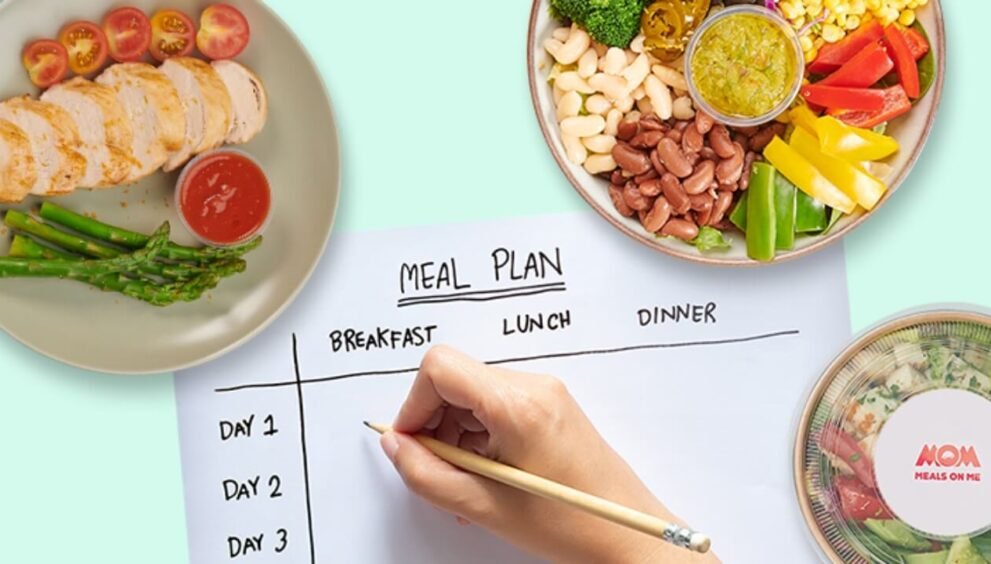The Ultimate Guide to a Better You Meal Plan

Are you tired of feeling sluggish, battling constant cravings, or simply not reaching your health goals? The secret might not lie in restrictive diets or grueling workouts, but in something far more sustainable:better you meal plan. Crafting a meal plan tailored to your specific needs and goals is the cornerstone of a healthier, happier, and more energized life. This guide is designed to walk you through every step, empowering you to create a plan that actually works for you.
Why Meal Planning is Your Secret Weapon
Meal planning often gets a bad rap. Many picture rigid, bland meals and hours spent meticulously weighing every gram of food. However, the reality is far more flexible and rewarding. It’s about taking control of your nutrition, setting yourself up for success, and making choices that nourish your body and mind. Therefore, let’s explore why it’s such a powerful tool.
- Firstly, meal planning saves you time. Think about the countless minutes you spend each week wondering, “What’s for dinner?” and then rummaging through the fridge only to order takeout again. A well-structured meal plan eliminates that daily decision fatigue and allows you to streamline your grocery shopping and cooking.
- Secondly, it saves you money. Impulse buys and last-minute takeout orders are often driven by hunger and convenience, not health or value. With a meal plan, you buy only what you need, reducing food waste and preventing those budget-busting trips to the drive-through.
- Finally, and perhaps most importantly, meal planning improves your health. By pre-planning your meals, you’re more likely to make conscious choices about what you’re eating. Moreover, you can focus on incorporating whole, unprocessed foods, controlling portion sizes, and ensuring you’re getting the nutrients your body needs to thrive.
Defining Your Goals: The Foundation of Your Meal Plan
Before you even think about recipes or grocery lists, it’s crucial to define your goals. What do you want to achieve with your better you meal plan? Are you looking to lose weight, gain muscle, improve your energy levels, manage a specific health condition, or simply eat healthier overall?
Here are some examples of specific, measurable, achievable, relevant, and time-bound (SMART) goals:
- Weight Loss: “I want to lose 1-2 pounds per week for the next 12 weeks.”
- Muscle Gain: “I want to increase my lean muscle mass by 2 pounds in the next 8 weeks.”
- Improved Energy: “I want to feel energized throughout the day and avoid afternoon slumps within 4 weeks.”
- Blood Sugar Control (for Diabetics): “I want to maintain my blood sugar levels within the target range recommended by my doctor for the next 3 months.”
Once you’ve clearly defined your goals, you can tailor your meal plan to support them. For instance, if your goal is weight loss, you’ll focus on creating a calorie deficit. If your goal is muscle gain, you’ll prioritize protein intake.
Understanding Your Nutritional Needs
Now that you’ve set your goals, it’s time to understand your individual nutritional needs. This involves calculating your daily calorie requirements and macronutrient ratios (protein, carbohydrates, and fats). There are numerous online calculators and apps that can help you determine your basal metabolic rate (BMR) and total daily energy expenditure (TDEE).
Your BMR is the number of calories your body burns at rest, while your TDEE takes into account your activity level. Based on your goals, you can adjust your calorie intake accordingly. For weight loss, you’ll typically aim for a deficit of 500-750 calories per day. For weight gain, you’ll aim for a surplus of 250-500 calories per day.
Your macronutrient ratios will also vary depending on your goals and preferences. Here are some general guidelines:
- Weight Loss: 40% protein, 30% carbohydrates, 30% fats
- Muscle Gain: 30-40% protein, 40-50% carbohydrates, 20-30% fats
- General Health: 30% protein, 40% carbohydrates, 30% fats
Remember that these are just guidelines. Experiment with different ratios to see what works best for your body.
Building Your Perfect Plate: Food Choices Matter
The types of food you choose are just as important as the quantities. Focus on incorporating whole, unprocessed foods into your meal plan. This includes:
- Lean Proteins: Chicken breast, turkey breast, fish, lean beef, eggs, beans, lentils, tofu.
- Complex Carbohydrates: Whole grains (brown rice, quinoa, oats), fruits, vegetables, sweet potatoes.
- Healthy Fats: Avocados, nuts, seeds, olive oil, fatty fish (salmon, tuna).
- Vegetables: A wide variety of colorful vegetables, including leafy greens, cruciferous vegetables, and root vegetables.
Avoid processed foods, sugary drinks, and excessive amounts of saturated and trans fats. These foods are often high in calories and low in nutrients, which can sabotage your progress.
Reddit Real Talk: Meal Prep Struggles and Solutions
Reddit’s r/MealPrepSunday is a goldmine of information for anyone looking to master the art of meal planning. One common theme is the struggle with food boredom. As one user put it, “I love meal prepping, but I always end up hating the same meal by Wednesday!”
So, how do you combat food boredom?
- Variety is Key: Don’t be afraid to experiment with different recipes and flavors. Rotate your meals regularly to keep things interesting.
- Repurpose Leftovers: Get creative with leftovers. Turn leftover grilled chicken into a salad, or use leftover roasted vegetables in a frittata.
- Spice It Up: Use different spices and herbs to add flavor to your meals.
- Don’t Over-Prep: If you’re prone to food boredom, try prepping only a few days’ worth of meals at a time.
Another common challenge is finding the time to meal prep. Reddit users recommend setting aside a specific time each week for meal prepping and making it a non-negotiable appointment with yourself. You can also break up the tasks into smaller chunks throughout the week. For example, you can chop vegetables on Monday night and cook the main dishes on Tuesday night.
Sample Meal Plan Template: A Starting Point
Here’s a sample meal plan template that you can adapt to your own needs and preferences:
Monday:
- Breakfast: Oatmeal with berries and nuts
- Lunch: Grilled chicken salad with mixed greens and a light vinaigrette
- Dinner: Baked salmon with roasted asparagus and quinoa
Tuesday:
- Breakfast: Smoothie with protein powder, spinach, and fruit
- Lunch: Leftover baked salmon and quinoa
- Dinner: Turkey meatballs with marinara sauce and whole wheat pasta
Wednesday:
- Breakfast: Greek yogurt with granola and fruit
- Lunch: Lentil soup with a side of whole grain bread
- Dinner: Chicken stir-fry with brown rice
Thursday:
- Breakfast: Scrambled eggs with vegetables
- Lunch: Leftover chicken stir-fry
- Dinner: Black bean burgers on whole wheat buns with sweet potato fries
Friday:
- Breakfast: Whole wheat toast with avocado and egg
- Lunch: Tuna salad sandwich on whole grain bread
- Dinner: Homemade pizza with whole wheat crust, vegetables, and lean protein
Saturday:
- Breakfast: Pancakes (using whole wheat flour) with fruit and syrup
- Lunch: Out to eat (choose a healthy option)
- Dinner: Steak with mashed sweet potatoes and steamed broccoli
Sunday:
- Breakfast: Waffles (using whole wheat flour) with fruit and whipped cream
- Lunch: Leftover steak and sweet potatoes
- Dinner: Roast chicken with roasted root vegetables
Tracking Your Progress and Making Adjustments
It’s essential to track your progress and make adjustments to your meal plan as needed. This will help you stay on track and ensure that you’re achieving your goals.
- Weigh Yourself Regularly: Weigh yourself once a week at the same time of day.
- Take Measurements: Take measurements of your waist, hips, and thighs every few weeks.
- Track Your Food Intake: Use a food tracking app or journal to track your calorie intake and macronutrient ratios.
- Monitor Your Energy Levels: Pay attention to how you feel throughout the day. Are you energized and focused, or are you sluggish and tired?
If you’re not seeing the results you want, don’t be afraid to make adjustments to your meal plan. You may need to adjust your calorie intake, macronutrient ratios, or food choices. It is time to refine your better you meal plan and make it work in the long run.
The Expert Weighs In
“The key to successful meal planning is personalization,”
says registered dietitian and nutritionist, Sarah Jones.
“What works for one person may not work for another. It’s important to find a meal plan that fits your lifestyle, preferences, and goals. Don’t be afraid to experiment and make adjustments until you find something that works for you.”
Overcoming Common Challenges: Staying on Track
Even with the best-laid plans, challenges will inevitably arise. Here’s how to overcome some common hurdles:
- Lack of Time: Schedule dedicated meal prep time. Even 30 minutes a week can make a difference. Consider batch cooking or utilizing time-saving kitchen gadgets.
- Eating Out: Plan ahead by researching menus and making healthy choices. Opt for lean protein, vegetables, and whole grains.
- Cravings: Satisfy cravings in a healthy way. If you’re craving something sweet, try a piece of fruit or a small square of dark chocolate.
- Social Events: Plan for social events by bringing a healthy dish to share or choosing healthier options when eating out.
The best advice from reddit is to track food intake! One person said that it makes one aware of how much calories and bad food is consumed. Therefore, it is important to track and measure!
Long-Term Sustainability: Making it a Lifestyle
The ultimate goal is to make meal planning a sustainable lifestyle habit. This requires a shift in mindset and a commitment to prioritizing your health and well-being. You have to ensure better you meal plan works in the long run.
- Focus on Progress, Not Perfection: Don’t get discouraged if you slip up. Just get back on track with your next meal.
- Be Patient: It takes time to develop new habits. Be patient with yourself and celebrate your progress along the way.
- Make it Enjoyable: Find healthy recipes that you love and that are easy to prepare.
- Seek Support: Connect with friends, family, or a registered dietitian for support and accountability.
Conclusion: Your Journey to a Healthier You
Creating a better you meal plan is an investment in your health, happiness, and well-being. By following the steps outlined in this guide, you can create a meal plan that aligns with your goals, preferences, and lifestyle. Remember to be patient, flexible, and kind to yourself throughout the process. With commitment and consistency, you can transform your relationship with food and unlock your full potential. Embrace the journey, celebrate your progress, and enjoy the many benefits of a healthier, happier you.








































































































































































































































































































































































































































































































